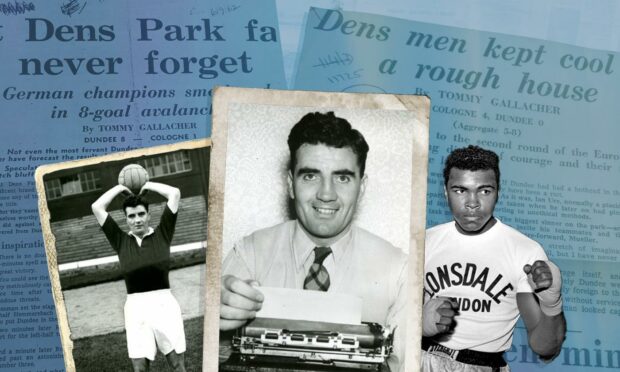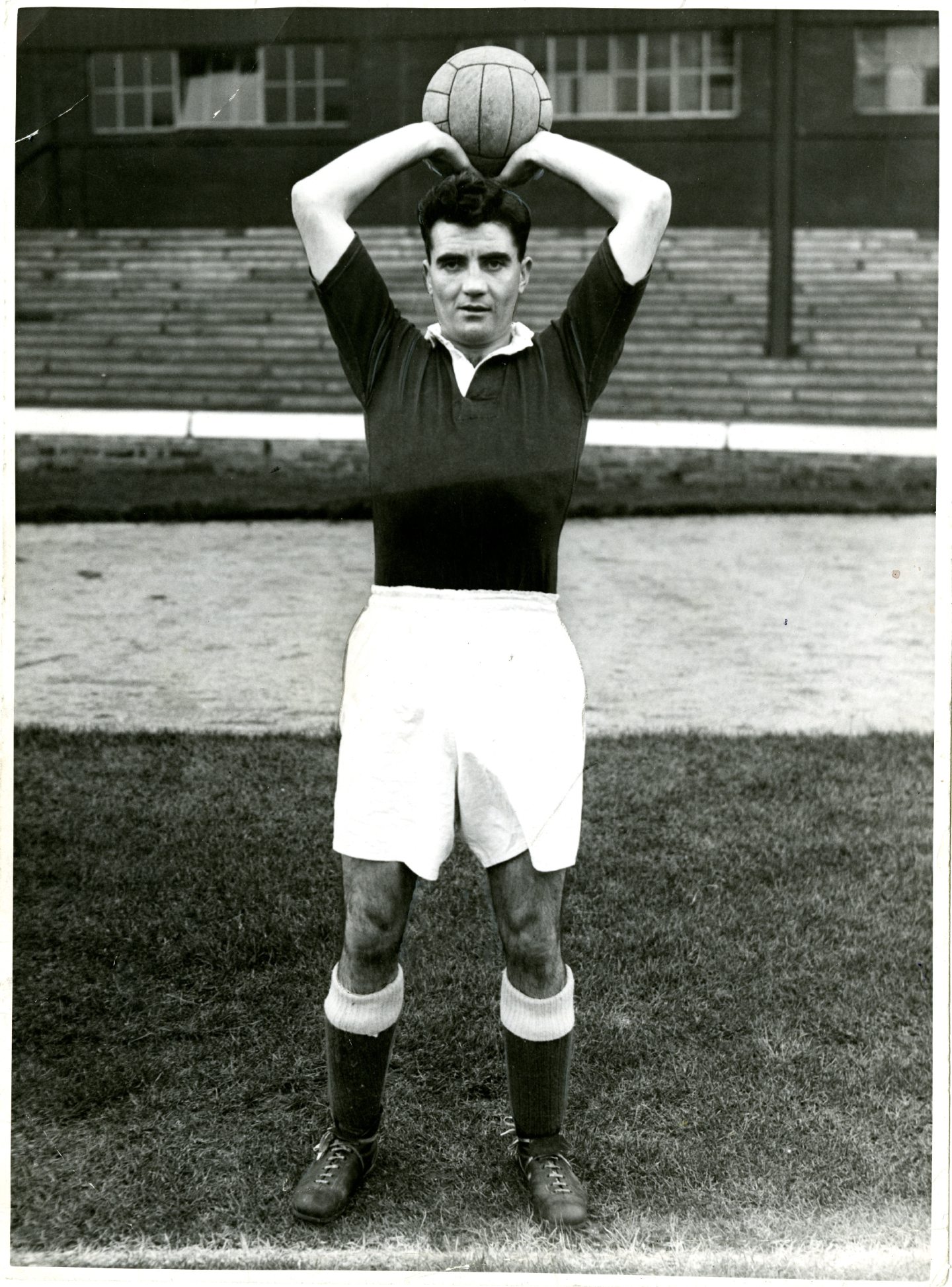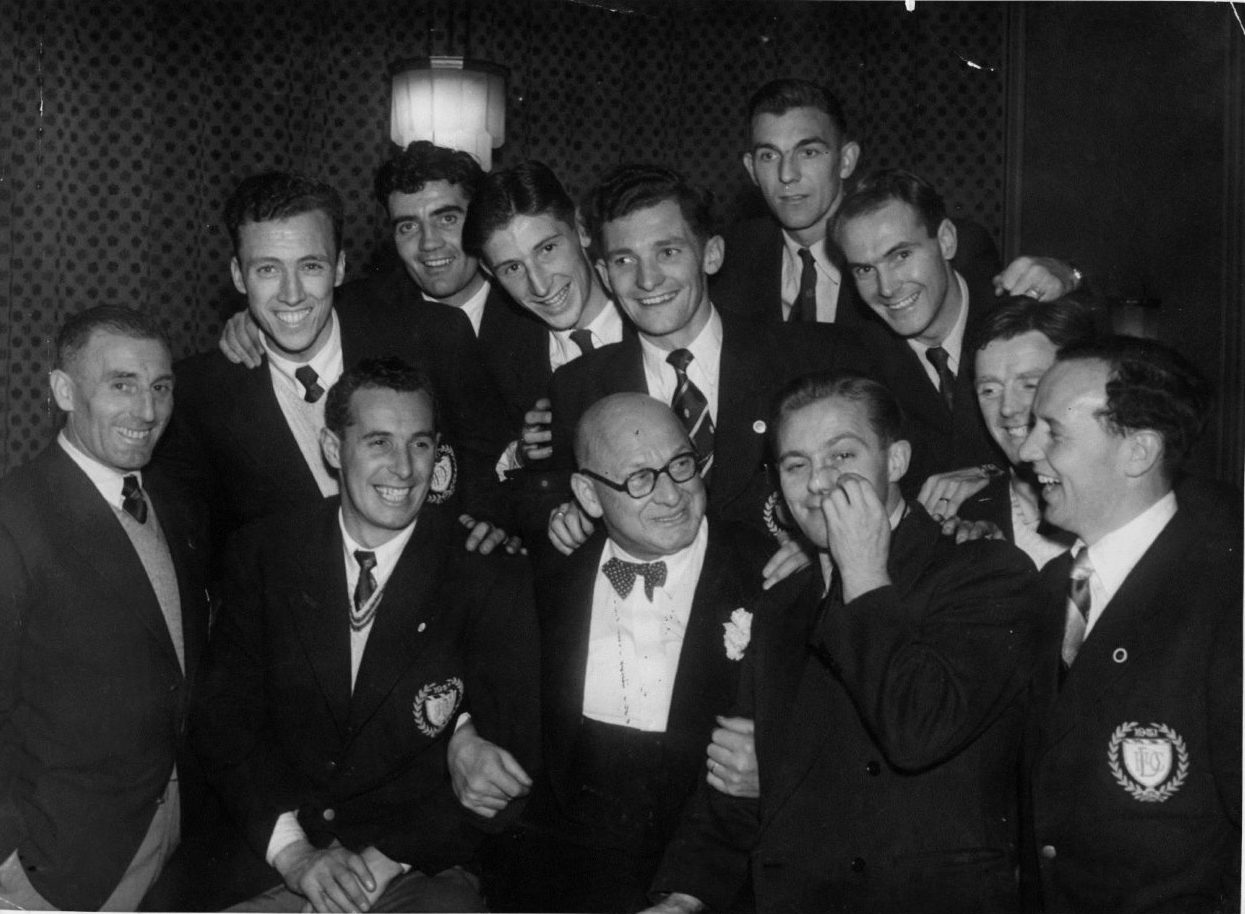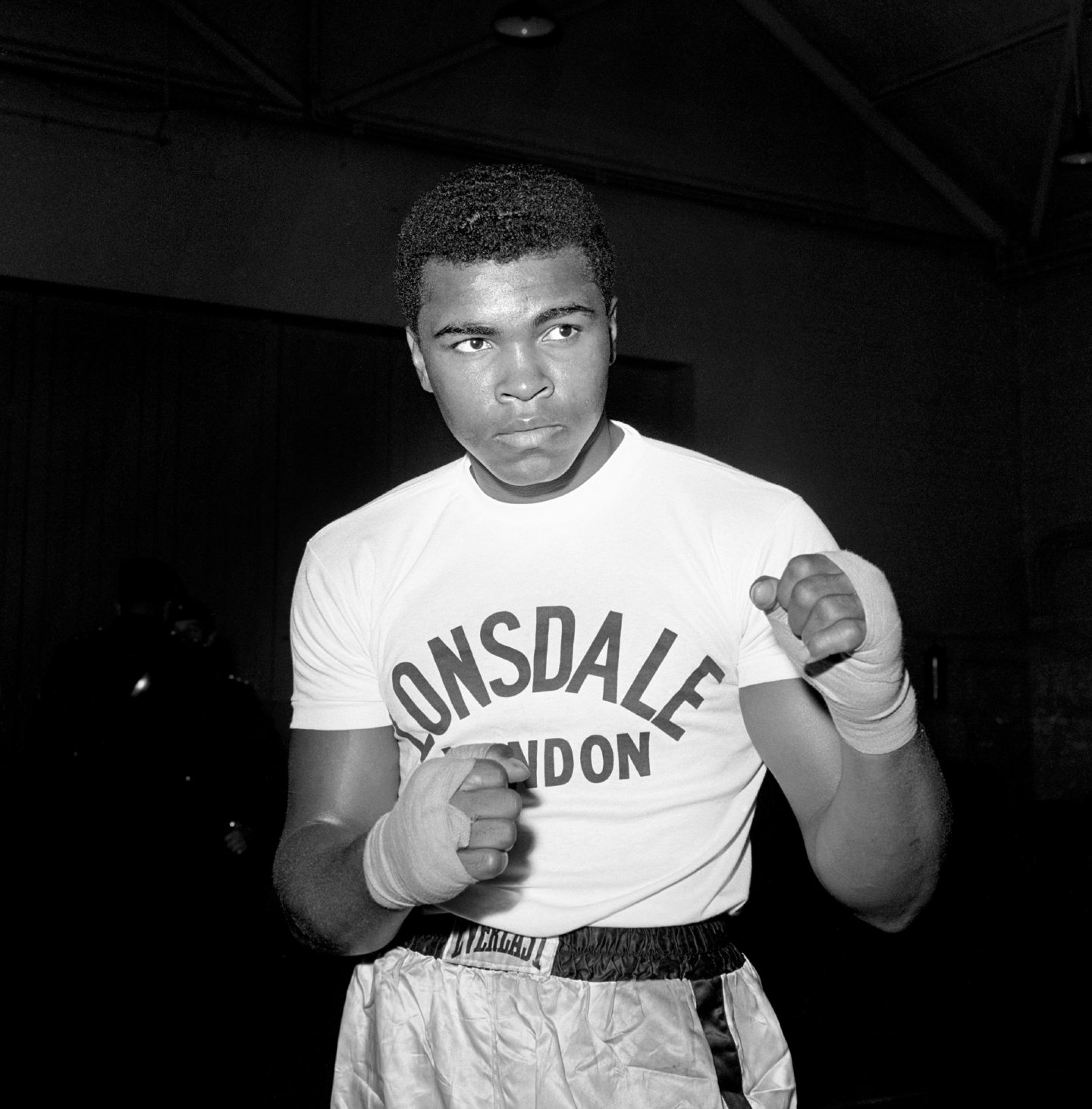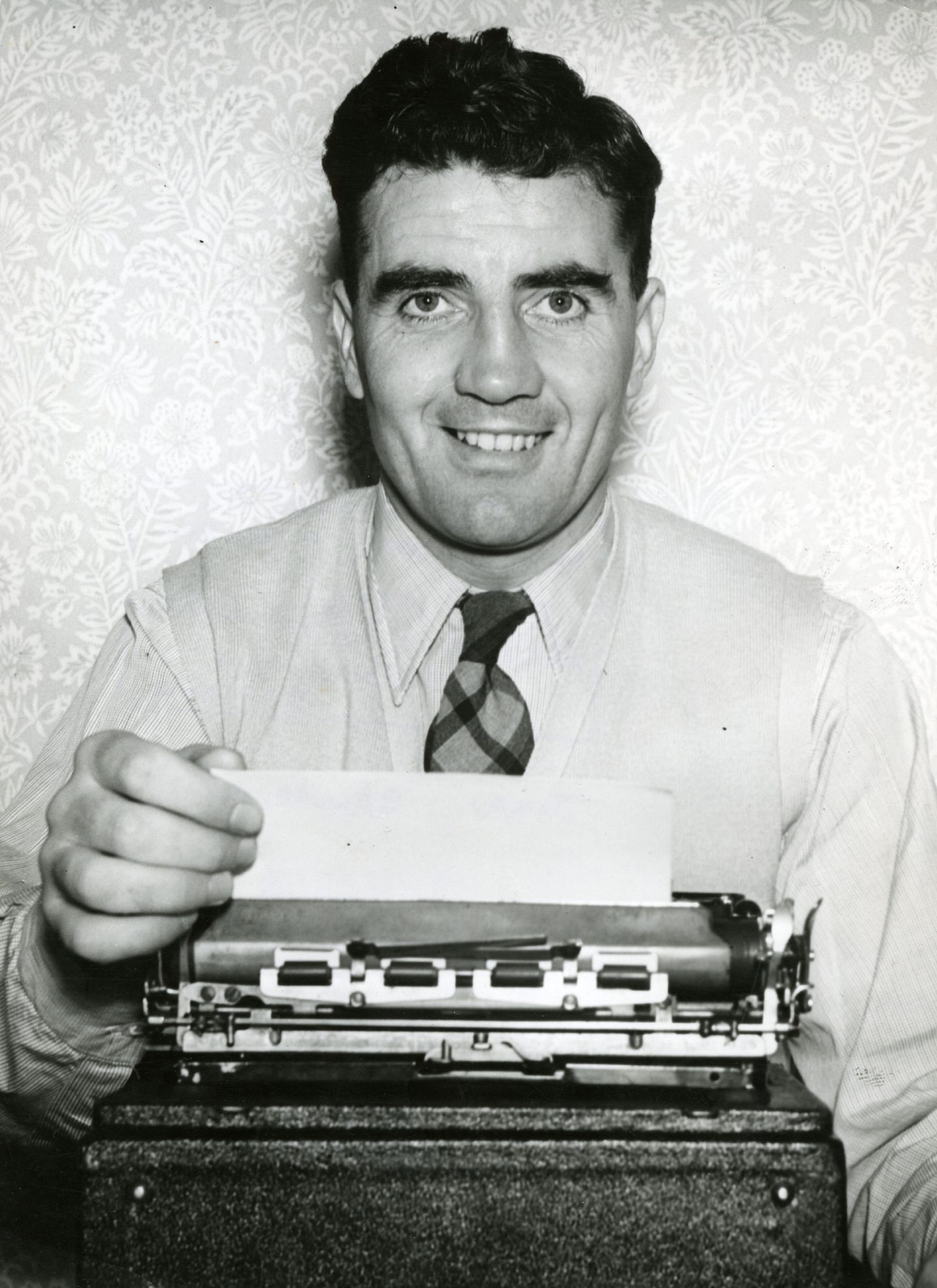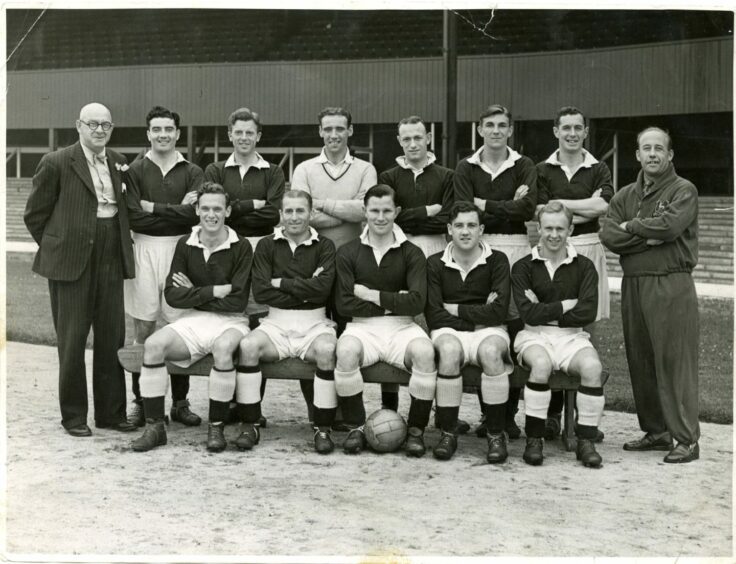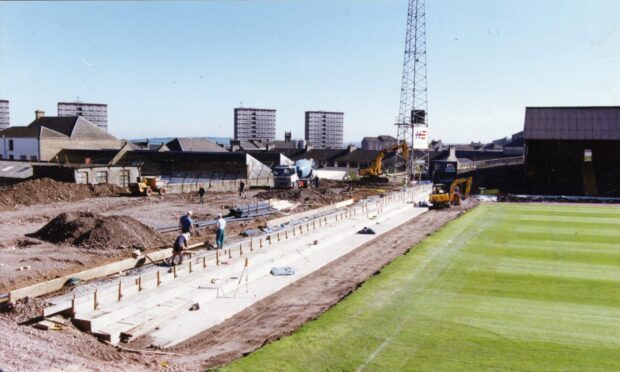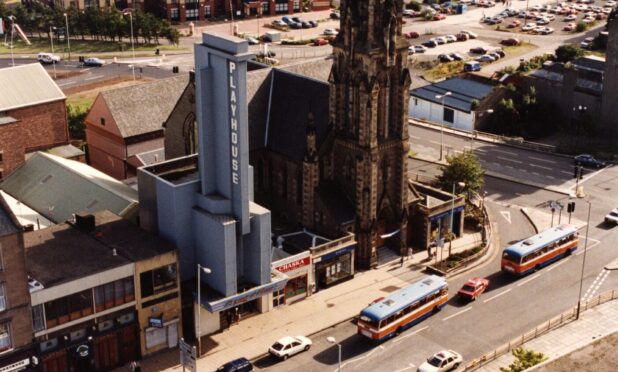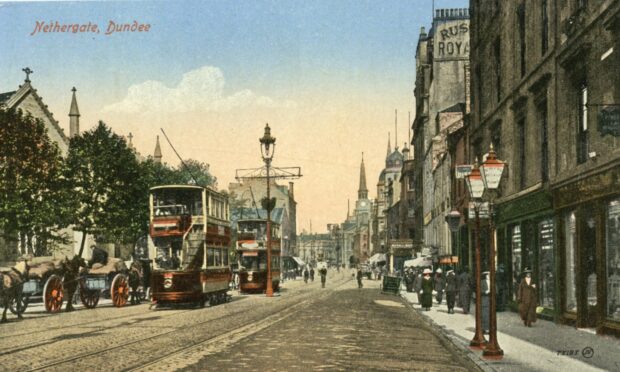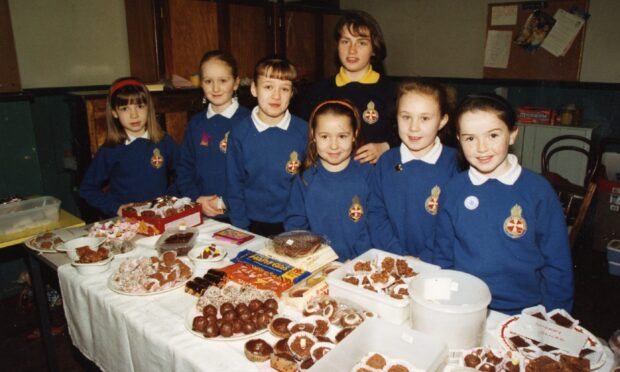Dundee FC legend Tommy Gallacher was a rare example of someone who gained public acclaim in two careers.
Tommy’s family life was centred on football and he was the son of the peerless Patsy, who played 464 times and scored 192 goals for Celtic from 1911 to 1926.
Patsy earned the nickname The Mighty Atom and won six league titles, four Scottish Cups, four Glasgow Cups and 11 Glasgow Charity Cups.
The Donegal-born forward also played 12 times for Ireland.
Patsy left Celtic and signed for Falkirk in October 1926 for a fee of £1,500 but his wife died three years later, aged 35, while giving birth to their sixth child.
Now Patsy had to combine his additional domestic responsibilities with his Brockville career while also running the International Bar in Clydebank.
Relegation dogfight
Two of his sons, Tommy and Willie, became footballers.
Tommy began his senior career at Queen’s Park, joining Dundee FC in 1947, although he had guested for the club during the war years.
Tommy played for Dundee in the game in April 1948 that might have seen Celtic relegated.
Celtic needed to win their final match, away at Dundee, to guarantee top-flight survival and scraped through 3-2 following a hat-trick from Jock Weir.
Not only was his father watching in the stand, Tommy’s elder brother, Willie, was actually playing for Celtic that day, after signing for the club in 1938.
The post-Second World War period was a golden era for Dundee.
I consider it a great personal privilege to have known Tommy Gallacher as a friend for so many years and enjoyed the pleasure of his company.”
Jim McLean
Along with Doug Cowie and Alfie Boyd, Tommy formed the backbone of that famous, team with the legendary half-back still fondly remembered by older Dundee fans.
Dundee went into the final day of the 1948-49 season a point clear at the top and needing a win at Falkirk to bring the league flag to Dens Park for the first time.
But a missed penalty while the score was at 0-0 was a prelude to a 4-1 defeat, as a Rangers victory over Albion Rovers saw them leapfrog Dundee to take the title.
On several occasions the Dens Park side came close to further honours.
Yet there was only one medal for Tommy and that was the 1951 Scottish League Cup when Dundee beat Rangers 3-2 in the final at Hampden.
Bobby Flavell, Johnny Pattillo and Alfie Boyd were on target with victory going some way towards burying the bitter disappointment of what happened back in 1948-49.
Tommy was unlucky not to have been capped for Scotland.
One solitary appearance for the Scottish League against the English League at Newcastle in 1949 was his only international honour.
New career
He retired in 1956 and joined The Courier as a sports writer, reporting on the fortunes of both Dundee teams at home and in Europe for almost 30 years.
Tommy was given his own byline at a time when the publication was considered more important than the personality and pseudonyms were widely used.
The greatest moments of his journalistic career came when Dundee won the league for the first time in 1962 before chasing European Cup glory the following season.
Dundee prepared for the European Cup by taking part in a friendly tournament in New York which featured guest teams primarily from Europe.
Tommy reported on the tournament for The Courier and took several of the Dundee squad to watch the boxing at the St Nicholas Arena on their first night, where a brash young heavyweight named Cassius Clay defeated Billy Daniels in the main event.
He also set up a brief meeting between the future Muhammad Ali and the Dundee players in the locker room at St Nicks, which made for a great start to the trip.
Tommy covered every game at home and abroad as Dundee rampaged through their European Cup campaign, which started with them thrashing Cologne 8-1 at Dens.
Bob Shankly’s side then beat Sporting Lisbon and Anderlecht but faced the mighty AC Milan, who ended Dundee’s run at the semi-final stage.
Jim McLean
He also witnessed the emergence of Dundee United as a trophy-winning side after recommending Jim McLean for the manager’s job in 1971.
Tommy covered the glory years for McLean’s United in the 1970s and 1980s.
McLean would win two Scottish League Cups, a Premier League title, and get the club to within a whisker of making the European Cup Final in 1984.
Tommy was also much respected among those who followed St Johnstone, Raith Rovers and Forfar for the encouragement he gave to the smaller teams.
A long career in the press box brought many highlights.
He covered the famous 1960 European Cup Final when Real Madrid beat Eintracht Frankfurt 7-3 at Hampden, which he described as “the best game I ever saw”.
He was also in Lisbon in 1967 when Celtic became the first British side to lift the European Cup when Jock Stein’s side defeated Inter Milan 2-1.
Tommy also covered two World Cups, in England in 1966 and again eight years later when Willie Ormond’s Scotland were unfortunate not to progress from their section in West Germany.
He retired from his job in 1985.
Memorial service
The footballing world was united in grief when Tommy died, aged 79, in 2001.
Tommy married Cathy in 1952 and they had five children: Brian, Mark, Kevin, Sheila and Patricia.
Cathy, in spite of her father-in-law’s connections with Celtic, and her husband’s with Dundee, was a Dundee United supporter.
A more famous Kevin Gallacher was Tommy’s nephew, and when Kevin started his footballing career with Dundee United, he owed much to the encouragement of his uncle and aunt.
Former team-mates from the Dundee team of the 1950s – along with players, managers and directors of Dundee and Dundee United from later eras – joined several hundred mourners at St Patrick’s RC Church in Arthurstone Terrace for the memorial service.
Colleagues from journalism were also among the gathering for Tommy, who was described as the most generous and hospitable man that anyone could meet.
Former Dundee United manager Jim McLean broke it down further.
He said: “Tommy was an absolutely outstanding gentleman and my thoughts are very much with Cathy and the kids.
“Both senior clubs in this city owe him a great debt of gratitude and I know all too well that my own appointment as manager at Tannadice was largely due to the strength of his recommendation to the Dundee United board, a recommendation that was to a large extent forced upon him by Cathy’s links with the club!
“I consider it a great personal privilege to have known Tommy Gallacher as a friend for so many years and enjoyed the pleasure of his company.
“He was someone who never wished anything but the best for others and he will be sadly missed by very many people.
“If I have one regret it is that I never actually saw him play for Dundee, but I know he did that with the same level of commitment and enthusiasm that he brought to everything he was involved in.”
So which team did he support?
Doug Cowie, who with Tommy and Alfie Boyd made up the Dundee FC half-back line of the late 1940s and early ’50s, expressed his deep sense of personal loss.
“What I remember best about playing alongside Tommy was the great fun we had and the memories I have of running out at Dens Park with him and Alf are ones I have always treasured,” he said.
“I was at Dens from 1945-61, spanning Tommy’s period at the club, and I can honestly say I don’t think there was ever a bad word spoken between us in all that time.
“He really was a wonderful player and I consider it an honour to have counted myself as his team-mate and his friend.”
At the memorial service, son Mark said his father always answered those who asked him which team he supported by saying: “The team that plays the best football.”
Tommy did admit to three footballing loves of his life, however: Celtic, because of his family’s association with the Glasgow club, Dundee, for whom he played, and Dundee United, whose famous exploits in the 1980s he reported.
Tommy was inducted into the Dundee FC Hall of Fame in 2011 with the Heritage Award to mark not only his cultured playing days but his work in the newspaper industry.
A legend on and off the park, he is still revered 20 years after his death.
More like this:
Looking back at Dens Park: The stadium that saved Dundee Football Club
Fan Zhiyi in Dundee: When the Dark Blues signed the Chinese David Beckham
The real-life Escape To Victory: How Dundee footballers survived a brutal German prison camp
